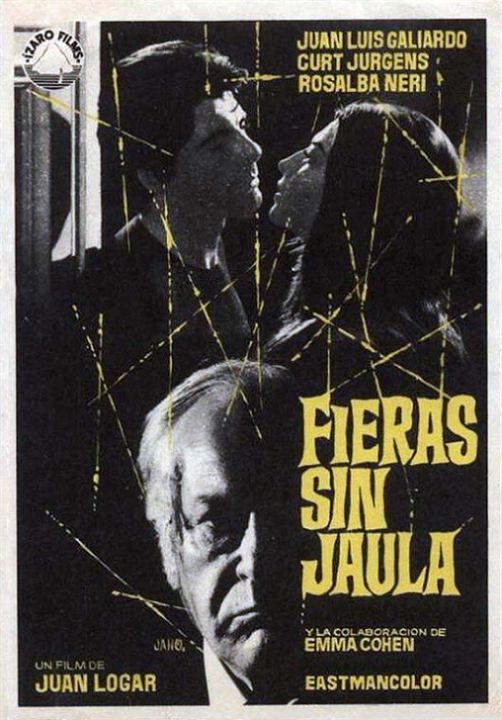Ronald Marvelling's daughter isn't happy with her father's recent behaviour; he's married her friend Alecsa, and will likely change his will to include his new bride. She's right to be suspicious-Alecsa actually fell in love with young cad Pietro before she even married Mr Marvelling, and wasted no time in beginning a cheeky affair. Marvelling, who had no illusions as to what made Alecsa fall for a septuagenarian millionaire (you might even say he wasn't marvelling at her apparent adoration...), is nonetheless distraught when he uncovers the affair, and he takes drastic measures to end his humiliation, and wreak revenge upon his unfaithful wife from beyond the grave...
Or is it from beyond the grave? This is one of any number of gialli which flirts with the idea of the dead coming back to life. In this case, apart from a brief hallucination towards the climax, we get the classic 'character-who-sees-a-corpse-move' trope. And, in common with most depictions of this scenario, we don't actually see the alleged movement. This tends to set up a situation wherein we question both the sanity and motives of the person (usually a woman) who claims to have seen the reanimation. Are they seeing things due to psychological distress, or are they acting out a pre-ordained role, either wittingly or unwittingly, which calls for them to plant a ghost seed in the minds of their companions? In this case, it's fairly clear that we're not witnessing an example of the latter instance. As with the majority of the films which incorporate potential corpse reanimation, this isn't a black-gloved-killer-on-a-spree film; it's of a more psychological bent. In fact, this film delves deeper into its characters' psyches than almost any other giallo, with largely admirable results.
The characters are given far more space to breathe than is usual in a giallo, and for much of the running time we see two of the characters trapped in a seaside apartment with no means of escape. We witness the (rapid) deterioration of alliances and social niceties among the imprisoned pair, with frequent cutaways which initially fill in the blanks as to how the characters have ended up in their unfortunate situation. As the film progresses the cutaways become more abstract, ending up as a beguiling mixture of memories and fantasies, with dialogue in the makeshift prison morphing from external sniping to internal monologues and imagined/reinterpreted conversations. Things become almost poetic, and the juxtaposition of the increasing dehumanisation and savagery of the living conditions within the prison with the memories and regrets of the characters creates an intoxicating atmosphere of raw human emotion. It's more Last Year at Marienbad than Strip Nude for Your Killer (although Rosabla Neri does come through with some nudity early doors), but all the better for it.
That's not to say that the film will blow you away emotionally, as the people at the centre of the film are quite base, and the more room that's given over the characterisation, the more we see that these are vapid, borderline uninteresting characters. However, there's something about the juxtaposition between past and present which gets me in films; a raw power generated by the direct acknowledgement of the inexorable passage of time which is ultimately the black-gloved killer stalking us all. Simple scenes which would mean little on their own become powerful eulogies to a time past, a time lost, which will never be recovered. Juan Logar, who was active as recently as 2013-showing admirable defiance in the face of time's relentless march-understands the power inherent in such temporal juxtapositions, and does a fine job balancing the necessary genre elements (sex scenes, occasional mild gore and whiskey drinking*) with the more arty concerns.
Style-wise, there's not a huge amount going on, although one distinct camera movement recurs so often that it bears analysis. The move in question is a crab around from a tight close-up of one character to an over-the-shoulder shot of the same character and the person to whom they're talking. It's possibly meant to represent the decision to share oneself with another that is the fundamental basis of all relationships. Or, it might be a visual representation of the duplicitous turn taken by Alecsa's affections. Equally, it might just have been a economical way of cutting down on the number of camera set-ups.
The music is initially ludicrously bombastic, but once it settles down it becomes surprisingly effective, and evokes the right amount of nostalgia and wistfulness in later scenes. The acting, too, is more than serviceable, with the vast swathes of the film passing without any spoken dialogue never really dragging. In fact, the only time things do get a bit too slow occurs right at the beginning, when we witness Marvelling wander around his apartment examining the window shutters and observing his wife fool around on the beach below the house. We have no frame of reference as to what's going on, and what is going on takes so long that interest wanes somewhat, but once this sequence passes things pick up nicely.
|
|
It should be clear by now that this film won't be for everyone, but it's certainly one for me. If you're less cerebral and romantic than me, this may not be for you (LOL jk; but not really-if you're a gorehound you will hate. this. film.). But if you're looking for something a bit different in your gialli, or looking for gialli that aren't really gialli, then look no further.
*The Blu ray I own actually calls the film 'Bitterer Whiskey', with the volume of the titular drink consumed being among the highest in the genre. Amazingly, there isn't a bottle of J&B in sight either. |

 RSS Feed
RSS Feed
